WATER CRISIS
Billions down the SA big-city revenue drain as 40% of purified water is lost to pipe leaks
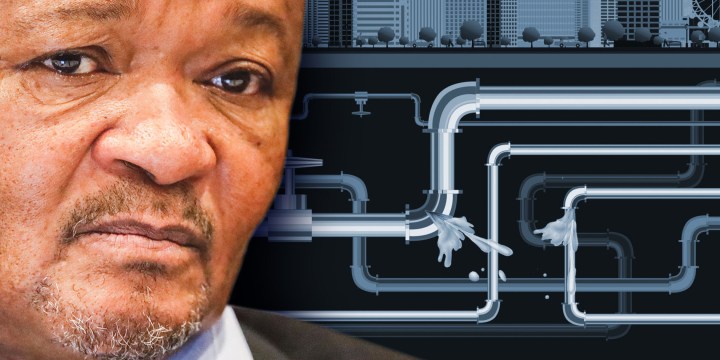
Water losses, mostly caused by leaking or broken pipes and infrastructure, are untenably high in major cities. The biggest loser is Durban at 58%. At a national level, the government’s most recent water balance sheet puts non-revenue water losses at 47.4%, with pipe leaks calculated at 40.8%.
Almost a decade after the government declared a nationwide “war on leaks” campaign, the volume of water loss is getting worse. Nearly half the country’s purified water supply is now lost to leaks, theft or non-payment.
The latest benchmarking report on water losses in eight of the country’s big cities suggests that the worst culprit is Durban, where more than 58% of tap water supply is classified as non-revenue water.
But Johannesburg is hot on its heels at 48.2%, followed by Gqeberha (48%), Bloemfontein (46.4%), East London (37.7%), Pretoria (32.6%), Ekurhuleni (30.9%) and Cape Town (29.4%).
At a national level, the government’s most recent water balance sheet puts non-revenue water losses at 47.4%, with pipe leaks calculated at 40.8%.
Quite apart from the staggering waste of a vital resource in a water-scarce country, the increasing volume of water lost from leaking pipes means that most big cities are also forfeiting billions of rands in revenue streams that could be used to subsidise other municipal services. The money could be used to repair the collapsing pipelines and infrastructure blamed for the increasingly frequent water cutoffs or erratic supplies in towns and cities across the country.
Instead, the government is under increasing pressure to spend billions of rands on building new dams, even in other countries, to meet the growing demand in big cities, and municipalities are also ramping up utility bills to make up for their lost revenue.
This pressure includes the construction of the R39-billion Polihali Dam in Lesotho to supply Gauteng and a further R20-billion for a new dam in the uMkhomazi River in KwaZulu-Natal to supply Durban.
Though non-revenue water is a term that can include metering errors, water that is stolen or not paid for, the major component of non-revenue water is from physical leaks from broken or damaged pipes and infrastructure. The monthly 6,000-litre free basic water allowance per household is a constitutional right and is therefore zero-rated and excluded from non-revenue calculations.
For example, losses from actual water leaks in the eThekwini Municipality are now about 46%, and real losses from leaks at a national level have been calculated by the Department of Water and Sanitation at more than 40%.
At a provincial level, non-revenue water losses sit at between 46% and 51% in eight provinces. The notable exception is the Western Cape at just 26.9%.
Non-revenue water losses in some of the smaller municipalities are also through the roof. For example, at the end of 2023, these losses exceeded 93% and 85% for the Zululand and uMkhanyakude district municipalities, respectively.
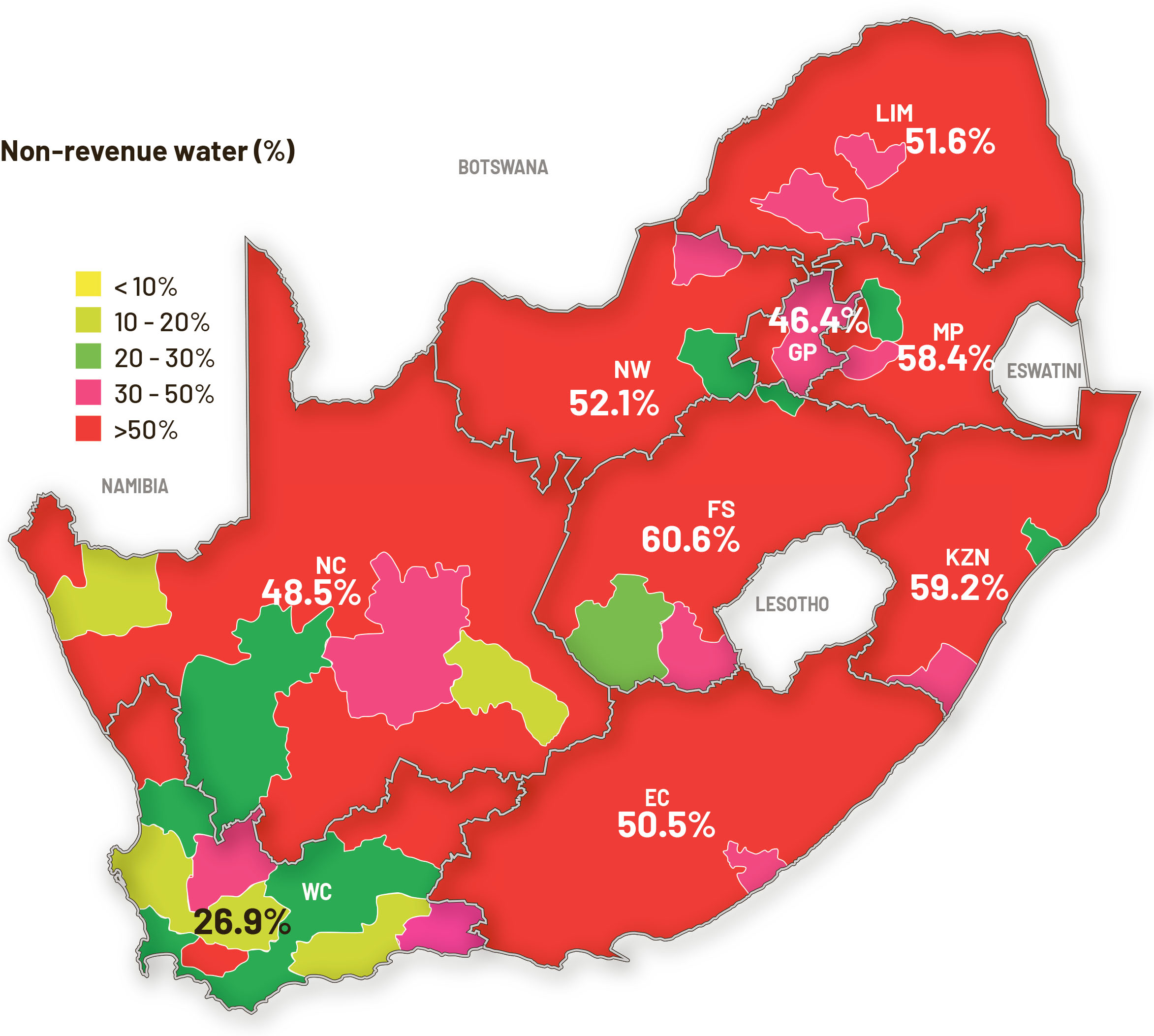
A map showing the percentage of water supplies lost in each province. (Source: Department of Water and Sanitation)
Urban consumption
However, such heavy losses are almost insignificant on a volumetric basis, as the lion’s share of the massive national water waste happens in the big cities, which collectively consume between 65% and 70% of all purified tap water supplies.
On a sobering note, Water Research Commission senior manager Jay Bhagwan points out that Gauteng, South Africa’s economic heartland, has almost no local water resources of its own, and it is increasingly reliant on massive water transfers from the Thukela River in KwaZulu-Natal or the giant Lesotho Highlands Water Project.
“The national water cup is finite,” he said. “It’s high time for the Department of Water and Sanitation to say to municipalities if you want more water, fix the leaks first.”
Bhagwan acknowledges that the urban water demand is growing rapidly as more people migrate to Gauteng and other urban centres from rural areas, but he cautions: “The cup is only so big. It is not acceptable if you continue along this trajectory of providing more water to service municipal leaks. It costs much more to build new dams compared with fixing leaks.”
Since Water and Sanitation Minister Senzo Mchunu’s appointment in August 2021, the department has started to crack the whip to force municipalities to reduce losses. But with national elections looming, it remains uncertain whether Mchunu’s latest national water-saving drive will translate into immediate action.
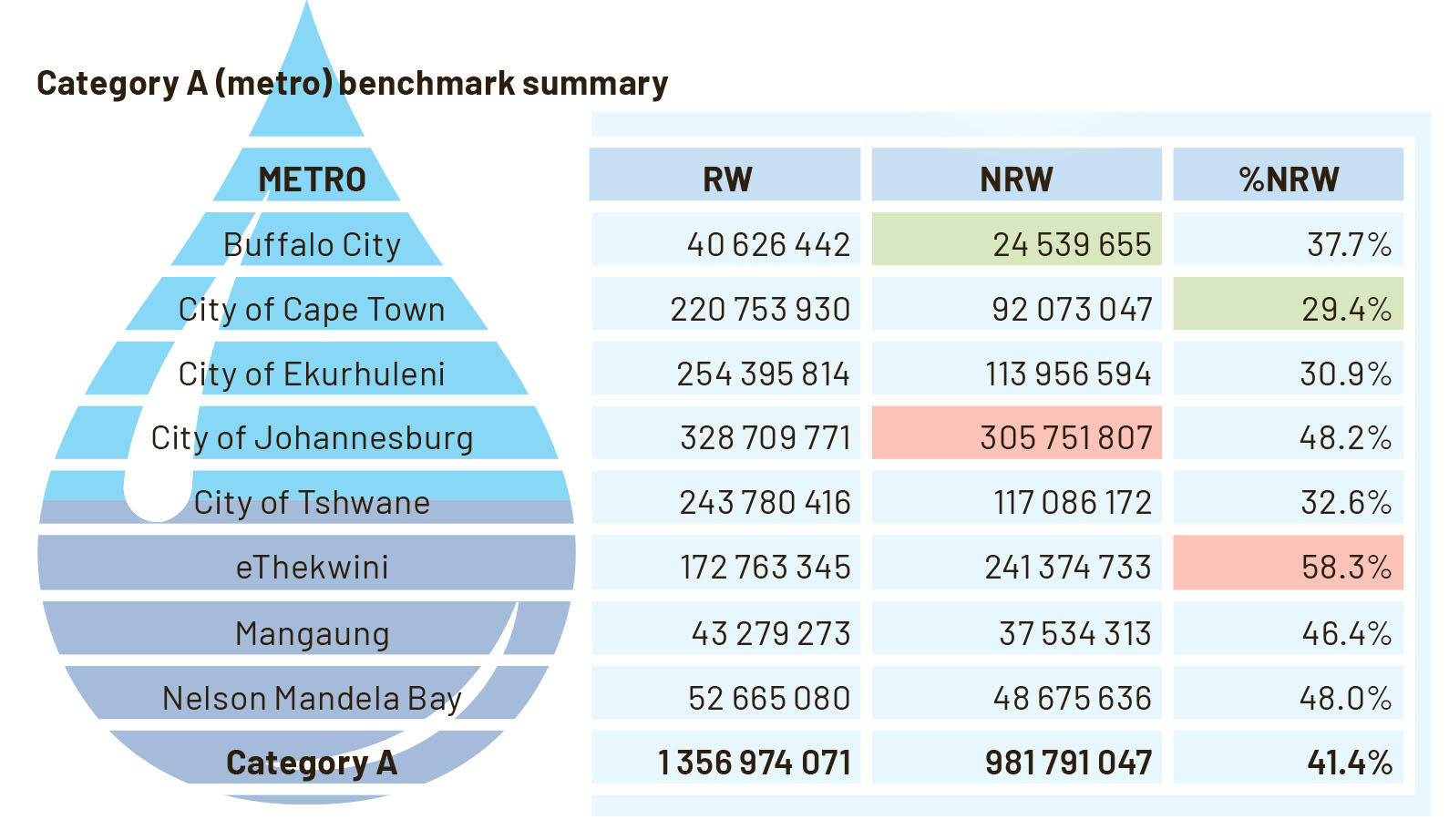
This table shows the percentage of tap water being lost in large cities across the country. RW is revenue water, which is the amount of water purchased by cities, and NRW is non-revenue water, which is what is being lost in various ways. (Source: Department of Water and Sanitation)
Durban leaking revenue
Late last year, the department issued a directive to KwaZulu-Natal’s biggest water utility, uMngeni-uThukela Water, to curb its water abstraction from the uMngeni River system by 8.5%. The utility’s major customer is Durban, where taps have run dry for several thousand residents over recent months.
But a senior insider attributes this lack of water to operational failures in the municipal supply scheme rather than the directive to lower the volumes abstracted from the Midmar, Albert Falls and Inanda dams.
At a meeting with the Department of Water and Sanitation in Durban on 27 March, eThekwini water department engineer Prathna Gopi said a target had been set to reduce Durban’s non-revenue water losses by 15% over the next three years. This promise will be scrutinised closely, considering that the city’s losses have risen steadily from 33% a decade ago to more than 58% now.
At the meeting, eThekwini’s ambitious pledge to curb water losses was tempered by a senior national water department official who noted that, measured on a monetary basis, current losses from water leaks in Durban were valued at about R7.6-billion a year in lost revenue for the municipality.
The official noted that the municipality buys about 1,100 million litres a day from uMngeni-uThukela Water. Based on the purchase price of just more than R10 a kilolitre, the 46% losses from leaks translate to about R155-million a month, or about R1.8-billion a year in direct, wasted costs.
However, the municipality marks up the purchase costs considerably for Durban’s domestic and commercial customers. So, based on a mid-level customer tariff of R42 per kilolitre, the 46% losses add up to nearly R638-million a month – or R7.6-billion a year – in lost municipal revenue. That’s more than 10% of the city’s total operating and capital budget for 2024/25.
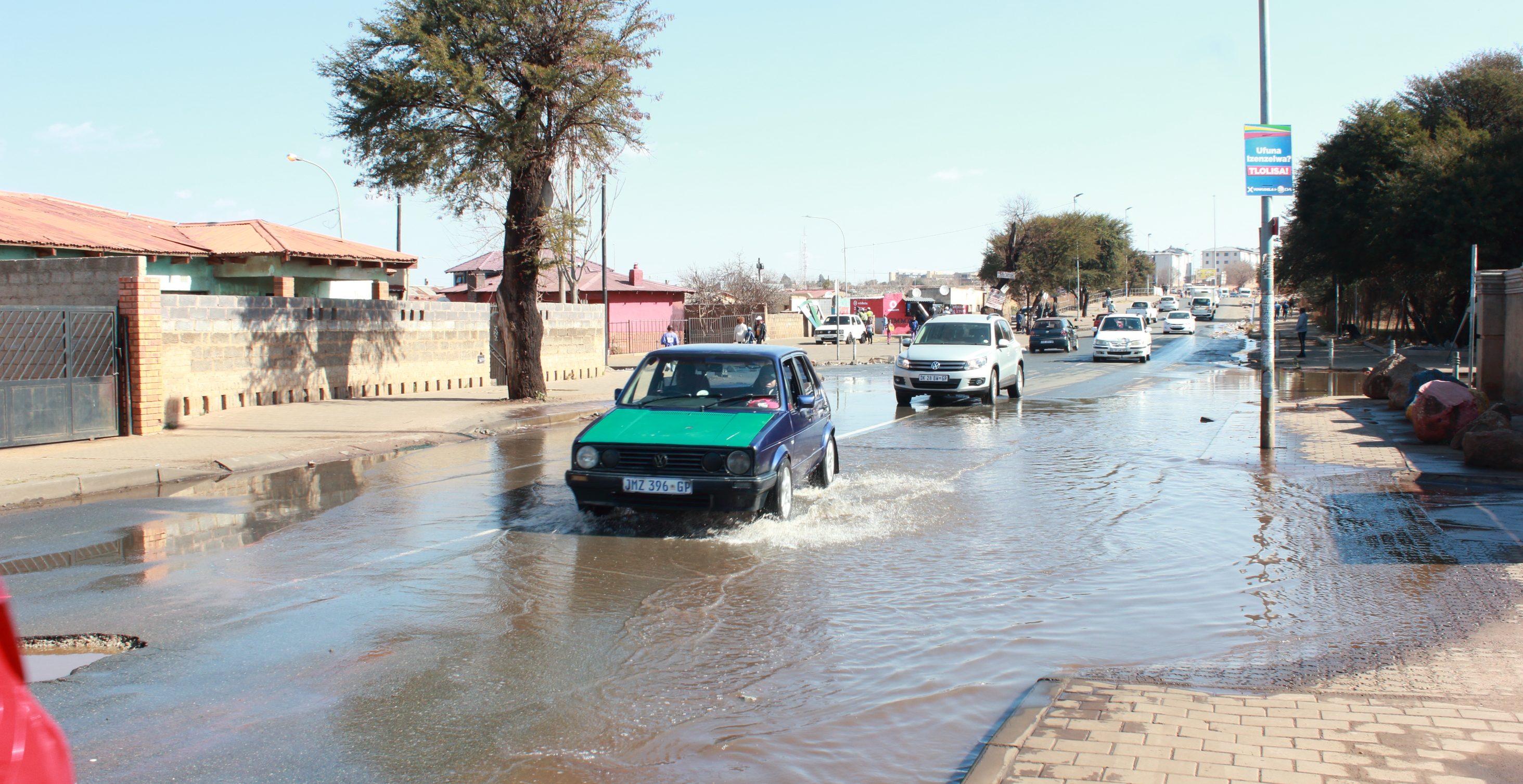
Motorists drive through water leaks along Mphuti Street in Soweto, Johannesburg, 8 July 2021. Damaged pipes and other water infrastructure not being fixed play a large role in the loss of water. (Photo: Fani Mahuntsi / Gallo Images)
Rand Water under pressure
In Gauteng, Rand Water is under similar pressure to curb its abstraction levels from the Vaal River supply system (which mostly depends on water transfers from Lesotho and KwaZulu-Natal rivers).
In its latest five-year business plan, Rand Water admits that it is already exceeding the volume of water it is allowed to abstract from the Vaal system, and new supplies from the Polihali transfer scheme in Lesotho will only come online in 2028. As a result, any further “excessive consumption” by cities it supplies was likely to result in water restrictions to ensure a sustainable supply until Polihali provides additional water.
What remains unclear, however, is what strategies municipalities in Gauteng and KwaZulu-Natal will use to respond to the looming water restrictions. In a presentation to municipal engineers in 2016, senior South African water engineer Ronnie McKenzie cautioned against simply cutting off water supplies at certain times of the day to reduce consumption.
McKenzie, a former chairperson of the International Water Association’s specialist group on water loss, warned that it had become common practice in developing nations to cut off water supplies for a few hours a day to save limited supplies.
But this seemingly cheap and effective solution carries major risks of long-term damage to infrastructure, and potential public health risks such as cholera and typhoid.
He explained that, when water supply is switched off and on frequently, the sudden changes in pressure can cause underground pipes to shift or crack, thereby damaging expensive infrastructure.
This strategy also creates an added danger to public health because sewage bacteria in the soil can enter cracked tap water pipes when they are depressurised.
During the 2016 drought, some municipal water suppliers had resorted to intermittent supply (cutoffs) to reduce water consumption, but the damage caused by this “quick and easy” method could take years to undo.
Instead, McKenzie suggested that municipalities should rather reduce the pressure levels in tap water pipelines to ensure a continuous, albeit slower, 24-hour water supply.
More recently, there have been indications that some municipalities are still opting to switch supplies off and on at certain times.
In a report in December, the Department of Water and Sanitation noted that, on average, KwaZulu-Natal residents only received water for 5.54 days a week in 2023. Customers in the Ugu District Municipality only received water for 4.13 days a week.
So, what are some of the possible solutions to breathing new life into the government’s stuttering “war on leaks” campaign?
What can be done?
A senior water engineer, who did not wish to be named because of continuing work relations with government departments, said the solutions did not require rocket science, satellites or artificial intelligence.
“It basically boils down to digging holes in the ground, and fixing the pipes properly as part of a properly planned and properly funded programme managed by skilled engineers.
“We have been talking about reducing non-revenue water for over 20 years, but it just keeps going up rather than down. It’s all just bloody talk,” he lamented.
“Yet during the ‘Day Zero’ crisis, Cape Town managed to reduce its water consumption by 50% without resorting to intermittent water supply cutoffs. That just shows what can be achieved when a city has its back against the wall.”
A further example of what can be achieved comes from the Drakenstein District Municipality (Paarl and Wellington area), which reduced its non-revenue water from 35% to less than 10% after a concerted campaign.
The municipality’s senior water manager, André Kowalewski, acknowledges that non-revenue water losses have crept up to about 17% recently, but it remains one of the best examples of efficient water management in the country. DM
This story first appeared in our weekly Daily Maverick 168 newspaper, which is available countrywide for R29.
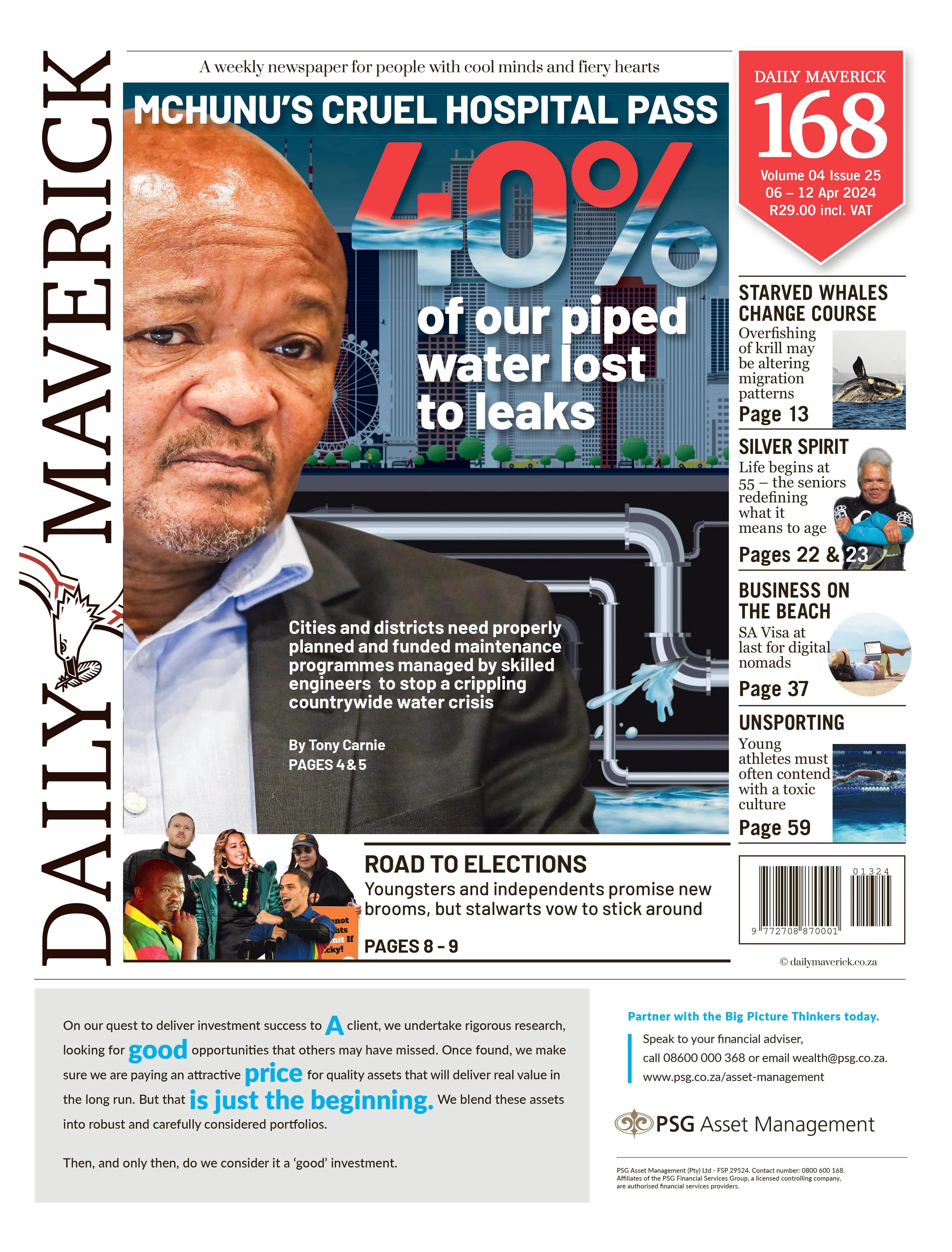




















What worries me most is that the people who should be working for good water reticulation don’t seem to realise what is being wasted. Never mind the disgruntlement at the lack of delivery of good education, electricity, housing and food security, because when water scarcity looms larger in the near furture, there will be bloodshed.
Absolutely
‘Almost a decade after the government declared a nationwide “war on leaks” campaign, the volume of water loss is getting worse’.
This represents typical ANC government inaction/incompetence/incapability/corruption….etc. The former school teacher who is now the minister is out of his depth. He barely understands what his advisors tell him.
This pattern is repeated in all other government departments.
Sadly so!
But it is apparently better than 30 years ago?
One should also remember that Zuma promised jobs! And the training of young people to be plumbers! Unbelievable! Well in fact not – the issue, Ramaphosa and kie, is that one needs to maintain working systems to keep them working. One can skip it for a year maybe two and you can keep on pushing until the taps run dry!
For proper maintenance, one needs properly trained people – disregarding the color of their skin. You have traded skills for jobs with people without it to get a quick gain in the vote. The people that you are so- called serving with you BEE and AA are going to get thirsty and hungry and with Bela, even more uneducated.
I don’t make a habit of responding to such utterances. Not even sure if this is directed to me/two words above. Seems quite an incoherent overreaction. If this is directed at me…I witnessed the last few years of apartheid. Brutal. My family, friends, community lived through it. Some of us made it through. Some haven’t. This is not abstract to me. Surprisingly, I and a lot people hurt by the previous regime do not seek revenge or carry hate. If that was so, EFF would be the dominant party in SA. I just haven’t forgotten where I/we come from. I’m also not in denial about the suffering that has continued the last 30 years. This is also not abstract to me. I just get frustrated with people who pretend or deny that we live with legacy of our past. Political and social scientists have attested to this. It’s not just my opinion. All lives have a legacy. I also get frustrated with talking down at the poor. Particularly when it comes from those previously privilege. The poor didn’t choose their station. Acknowledging our past and its effects doesn’t mean support, for corruption. Don’t care about colour. I’ve no political affiliations, not that I need to explain my politics. Not campaigning for anyone. I care for human rights, easing and hopefully end of suffering. Am not claiming to serve anyone. I AM one of those people. My family/friends ARE some of those people. We neither benefited from apartheid nor BEE. Those of us who’ve made it, it’s through luck, hard graft & determination
Reading the comments, I didn’t see it as a dig at you and I agree wholeheartedly with the points you make. However, we can’t do anything about an unjust past but we can do something about the future by demanding accountability and providing solutions.
We are out of time South Africa. We need to stop bemoaning the problems and do something about them.
And its so easy. Just tell everyone you come into contact with to vote DA – it is so easy to explain the benefits as they are already clearly visible.
Get this right and I can absolutely guarantee you our lovely country will improve – for every citizen.
They dont fix it,they steal the money for themselves
What do you expect from brain dead, corrupt, anc morons. As long as their personal toilets flush, they don’t give sh*t about the rest of us! Pun intended.
Totally useless and beyond redemption!
And who do we thank..NOT Boland Bank…..Thank all the incompetent crooked cadres!
That would be because Boland bank went Fudd. Quite spectacularly….just like the bloody ANC is my devout hope!
Shocking, but it would have been nice to see a water waste comparison with other countries.
The problem is that municipalities don’t allocate enough budget to repair water and sewer lines and that operational staff in the Water and Sanitation departments are hamstrung by the lack of resources.
I know this first hand because I’ve been engaging with City of Ekurhuleni since 2018 to find and repair a water leak that wastes 174 million litres a year. The water makes its way to the natural pan of the Korsman Bird Sanctuary in Benoni where it causes environmental problems in different ways.
But the source of the leak is still unknown and there is no budget for underground leak detection. So this leak is low on the list of priorities because it’s not in the public eye and municipal officials are under pressure to send their few allocated teams of contractors elsewhere.
The solution is political will in the councils, who pass the budgets, to take it seriously and understand that clean water is life.
The solution is voters who suddenly develop the intelligence to make better choices.
Of course, this won’t happen.
No pills for stupid.
The same losses apply to electricity. Treasury has set guidelines for acceptable losses which are in the region of 10 to 15%. The reported losses have increased by 3-5% every year due to mismanagement. As with Eskom, cadre deployment has removed the skills and the commitment. The water problem is further exacerbated by the sewage systems that do not work, causing water that could have been recycled to end up polluting rivers and the ocean. Typically, no infrastructure is maintained. Only emergency repairs are done. There is no capital budgeted to replace old infrastructure.
The solution is not difficult, fix leaks as soon as they are identified. Many reported leaks take weeks to be resolved. And then be proactive and identify the leaks as soon as they occur by installing IoT smart water meters on every valve so that you can be notified as soon as there is a potential leak. These devices can be had for as little as R2500 each and will end up saving an enormous amount of money. A leaking toilet loses between 135 and 32400 litres of water a day, as a simple example. I understand that the whole water network has actually been mapped by experts so it should not be an issue to identify how many valves there are in my Metro (Ekhurhuleni) but we need the political will to resolve it.
Truly demoralising. Government needs 24/7 policing. They want to hang PñP CEO from nearest tree for speaking the truth while they decimate the country.
One thing I have realised about life in general is that life is not a glamorous event where you get sip champagne and mingle with the bold and beautiful. I myself am not perfect as I still stay with my parents and I am chasing forty. I have spent ten years not working and building my life with a potential wife. I don’t have savings, or a car, or any form of investment and or related financial instruments. But I am black going to give my two cents worth regarding this topic. I didn’t even read the article, I came here just to offer my opinion. Regarding the leakages and whatnot, one is required to highlight the fact that governance is not a Durban July event type of thing. Nowadays we have people who don’t want to get their hands dirty, they just want to look pretty and whatnot. The time will come for us as citizens to roll up our sleeves and build our country, not by choice but because I will start a campaign that encourages citizens to build SA like China did in the fifties and sixties by having armies of people building irrigation systems and dams. China did this the hard way but we are a democracy and can do it the not so hard way. Maybe I live in cloud coo coo land or something, but there is a fine line between genius and madness
With no investment in upgrading infrastructure, this is to be expected. Then to make it worse the people employed are not the best, so the repairs are done with no quality.
I make two below.
As a visitor to Namibia I discovered an attitude of a National crisis relative to a leaking pipe or tap.
Perhaps we could learn something from Namibia.
I also want comment on an experience in a large Gauteng Metro . I lived in a very large Sectional Title Scheme, and the Municipal water charge was equivalent to the needs of a domestic kettle boiled once a day per residential unit. The problem was that the Municipality was reading the wrong meter. The meter being used was on a pipe previously supplying water to the property but replaced and the water charge was in fact a leak on that pipe.
There was no meter on the replacement pipe and the Body Corporate installed their own meter in order to manage its own affairs responsibly, but never notified the Municipality.
The issues which arise are that probably the uncharged water is classified as “leaks” when in fact it is “accounting”. That overstates the leaks and you never get the right answer to the wrong question.
Further, recognizing that the Municipality charges per sewer connection it has the information to calculate an average household use. Household use of a couple of liters a day should set of alarm bells and an investigation ensue. The under invoicing appeared to have been going of for at least 20 years.
I have been vague about the location of the Scheme so as not selectively cost my erstwhile fellow residents money, but rather to get the entire accounting system corrected.
Water delivered by tankers is a huge revenue earner for cadres and the like.
Why commiserate and moan when we can simply change for the better.
Its this simple. Vote DA and invest your energy in getting everyone you come into contact with to do the same.
I promise all of us a better future – in all our lovely colours.
Corruption and mis management
I wonder how accurate these frightening figures really are.
Do the municipalities have the slightest clue how much water flows through their pipes?
A case in point: UGU, south of Durban. Our water account for our tiny urban patch for November 2023: R66, 901- 85. For 1,403 KL.
My wife and I and 2 dogs consumed 1 million 400-odd thousand litres of the precious liquid in 30 days.
It had to be right, stated UGU’s staunch accounting supervisor: “It was an actual reading”. Just pay.
There’d been a major leak early in November with a river running down the road for a day or two and dry taps for only two days (unusually prompt for UGU).
Were we targetted to pay for the waste? (It’s hard to suppress paranoia when dealing with government). Or did the air compressed in the pipes spin our meter’s impellor like a Formula One car on nitro?
Who knows. We’ve never received another water account to date …
What do you expect when the head of the eThekwini department is not a professional engineer!
I am not sure its physically possible to pass that volume of water through the pipe which delivers water to you. Sounds like a reading fault of rather epic proportions. Maybe meter reader was drunk…or blind.
It is really city engineering for dummies. A few meters with SCADA capabilities and a computer programme with basic AI to track consumption during peak and off-peak times. But alas fixing infrastructure is not for politicians, what is for politicians is providing new infrastructure and then letting it go rack and ruin because of lack of any maintenance. Mchunu is the first minister in a long time to have a programme to effect repairs and actually do something about it. For his sake I hope he lasts
Very informative
Hi
Where did we go wrong? Will the time come when we’ll be saving our tear drops desalinating them and drinking them? And I am not speaking metaphorically either.
I once visited a company in an Asian country in which the state has a large shareholding. The employees have a mantra: “We care for the assets entrusted to us”. That is essentially what maintenance means. It is caring for our assets. It is evident that our government does not care for the assets entrusted to them, by the tax payers.
Almost no skills left, loss of institutional knowledge because of employement policies. Poor drawing records – so where are those isolation valves?
Poor pipe repairs that leak quickly again, little supervision from municipality, no accountability, no care. Many staff should not have been appointed – once in, hard to remove because entire management structure does not know what to do. Some contractors should not have been appointed. Who cares if raw sewage flows into the Vaal River or its tributaries? Guilty, incompetent Waste Water Plant Manager should have charged and sent to prison. No consequence for the person who hired these people. Thirty years in the making, very hard to change without good management from the Municipal Manager (skills) and Mayor (politics). No skilled manager would apply for these positions because replacing incompent workers is very difficult. Almost only way to rectify the situation is liquidate the facility and privatize with correct people in Government managing the Contract. The privatization of SAA is not going so well…..
Unbelievable, or it can be described as treasonous.
It’s obviously a huge waste and a disaster for the environment. The issue of water wastage is a global issue. “The UK is losing a staggering 3 billion litres of water each day through leaky pipes. The issue is not limited to the UK alone. Globally, almost 90 billion litres of water are lost daily, accounting for up to half of all the water pumped around the world.”
Simply go to discover water.https://www.discoverwater.co.uk/leaking-pipes
For an easier read go to https://theconversation.com/the-uks-water-pipe-upgrade-has-made-it-harder-to-detect-leaks-now-the-race-is-on-to-discover-new-ways-to-find-them-209537#:~:text=The%20UK%20is%20losing%20a,this%20water%20loss%20is%20substantial.
Thus is of course for perspective and not to say we shouldn’t do anything about it.
SA is simply trying to win the race and be the best international water waster
Learn from Israel how to manage water.
Every litre of clean water is paid for … no free water … it is too precious to give away for free.
Over population is the main CAUSE of the water deficit … especially Gauteng’s population must be reduced!
It all starts with allowing squatter camps (that serve as voter ‘fodder’ for the ANC and EFF).
Illegal squatting is the first stepping stone on the long road of criminality that lead to social disorder, violence, destruction and ultimately, anarchy!
As far as I know, here in the Kouga municipality (or at least in Jeffreys Bay) the water loss was reported about 5 years ago as 5%. All just because the municipality emphasized the importance of stopping the leaks; the municipal manager emphasized during an annual meeting that any employee of the municipality that drives by a water leak and does not report it, faces disciplinary action. I twice reported what seemed to be water leaks and within a few minutes someone called me back for details. So if it can be done here, why can’t the rest of the country do it?
There is lack of the running water 💦 pipelines inspection by the local authority water supply and sanitation department. We urge the local government officials to take this matter seriously and ensure inspection is done ✅
War on leaks started in 2015. “An internal audit by the Department of Water and Sanitation has revealed that even though almost R3 billion was spent on the War on Leaks project, it did not address or reduce water losses in the country.
The project, which was the brainchild of former president Jacob Zuma and was implemented by then water and sanitation minister Nomvula Mokonyane, also failed to train 15 000 unemployed youth, as envisioned.
The Special Investigating Unit has approached the Presidency and the justice department for permission to investigate the project. ”
But, instead of 15 000 jobs, the internal audit report stated, training for 852 people was completed and “the department did not maintain a trail of the number of trainees who [were] employed after the training [was] completed in order to have an overall impact that the training made in terms of creating jobs in the South African community”.
So badly was the project managed, that trainees’ bank details were not verified. Some were overpaid and some were not paid at all.
The department incurred an expenditure of R2 967 458 716 from 1 April 2015 to 31 August 2019.
The blame for the botched project was laid at Mokonyane’s feet.
Mokonyane is now high up in ANC Top 7 and besides Bosasa Zondo allegations shouts her mouth off at every opportunity. This and Lesotho Highlands botched project must put her high up on the list for prosecution before the elections.
Trencless Solutions can rehabilitate existing pipe installations by utilizing CIPP processes, extending existing infrastructure by 20 yrs
Yet another item to add to the mile long list of failures and still no consequences for corruption? When the president himself is guilty of wrong doing (Phala Phala), how can he point a finger at anyone else and be taken seriously? The whole ANC apparatus is rotten to the core and equally useless. I can only hope that the voters send them a very strong message in May. With all the money that has disappeared since 1994, It is no wonder critical stuff is starting to fail. Money that should have been used to facilitate a much stronger economy to provide jobs and we should be MUCH further down the track of lifting the poor people out of abject poverty into a half decent life but it seems “A better life for all” is incorrect and should rather be “A better life for all ANC officials”.
But we still vote ANC… Western Cape has bn fixing pipe leaks for 4 years now, look at their % rating…. DA actually produces results. There is your proof SA… Vote ANC and see what water is left in the next 4 years.
The African National Corruption party that has the majority in municipalities are simply useless.
I see pipes being “fixed” but all the work being done is carried out in a slapdash, slapgat, couldn’t be bothered to even pretend to do the job properly fashion. Tar is dug up to access pipes, then after the “repairs” the precious top soil is left exposed, all to be washed away with each downpour, with the hole just getting bigger, and this goes on for months, with the surface rarely being paved over again.
The kerb stones aren’t replaced, nor the paving stones, abd even the traffic lights aren’t replaced if it was removed to access pipes, and somehow the dept thinks this is all just swell to for such a piss poor job.
The ANC has no concept of the notion of maintenence and timely repairs, and no pride in the work they do.
They are utterly pathetic.
Say what you will about the Nats and the former Whites who ran the City of Johannesburg, but they did a good job, they fixed what needed to be fixed, properly and on time and took pride in doing a good job, and the repairs lasted for longer than a season.
They cared, they did a professional job and took pride in doing a job well done.
Bob F – April 8th 2024 at 19:02:
Another area where the ANC got rid of staff who knew all about water management and replaced them with comrades who knew nothing which resulted in the total chaos which has existed for 20 odd years. After all the tax payers money stolen nothing was left to repair damaged / broken piping. Furthermore the government ministers and senior staff needed line to establish which contractors could be trusted to, firstly provide over inflated quotations and secondly to give backhands on every contract awarded. Once done a contract was awarded and the quoted price automatically increased two or three of cold
It’s quite simple really – the one word missing from their collective vocabulary is …maintenance!
Those who live in the past cant tackle the future.ANC is about self enrichment,not about building a future